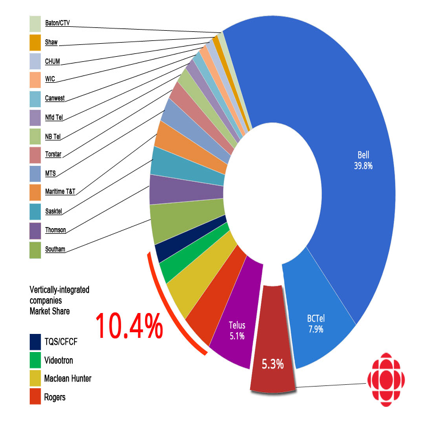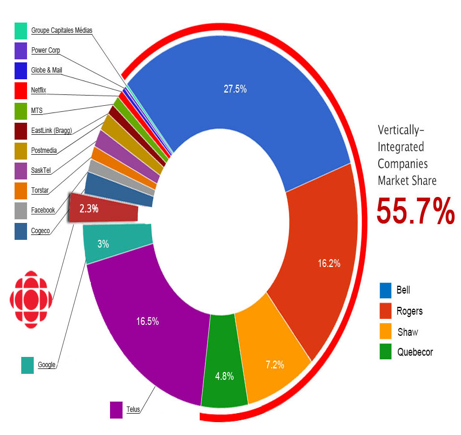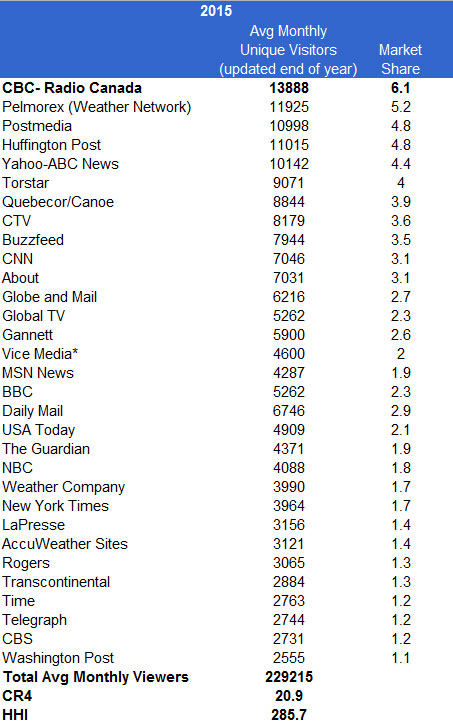The CBC’s Place and Role in the Networked Media Universe
Today I participated in a panel debate at the Manning Centre’s annual conference. It’s a big conflab that attracts a whose who list of the Conservative Party and party faithful.
The question we debated was, “Is it time to pull the plug on the CBC?” I debated the question with James Baxter from iPolitics and Brian Lilley, a co-founder of Rebel Media and all about town commentator for various conservative-type talk shows, publications, etc.
So, should we pull the plug on the CBC? I said no! What follows is a slightly tidied up copy of my talking notes.
Main Arguments for how to think about the CBC, and why we need it:
- Over the last three decades, the CBC has become a much dimmer star in a much larger internet- and mobile wireless-centric media universe;
- it is still important — just a lot smaller than it once was;
- the CBC should be put on better footings with respect to funding, its mandate and independence from the government of the day;
- However, I also wonder if focusing on the CBC is like looking at things through the wrong end of the telescope?
- Broadband internet and mobile wireless are now central to our whole way of life, economy and society, including the media, the CBC and journalism.
- We can no longer talk about the CBC, journalism or ‘the media’ without talking about internet & mobile phones.
- Mobile phone rates, data caps, broadband access, fibre-to-the-doorstep, and common carriage are as important as the CBC to most CDNs – in personal terms (intimacy @ a distance), social terms (access to knowledge, entertainment, opportunities, others), and $ terms (CDNs spend $5 on bandwidth for every $1 on media content).
I leaned on two main sources for my talk: Noam (2016). Who Owns the World’s Media. New York: Oxford University Press and, of course, the data sets and reports from the Canadian Media Concentration Research Project that I direct.
Argument #1: CBC is a small fish and a vastly bigger pond
It has shrunk greatly over time against the backdrop of a vastly larger media landscape, as Figure 1 below illustrates.
Figure 1: CBC vs Network Media Economy, 1984-2015, (Total $ millions)
 Source: Canadian Media Concentration Research Project (2016).
Source: Canadian Media Concentration Research Project (2016).
The role of the CBC has been dwarfed by a handful of developments:
- Wholly new media have been added to the media universe: e.g. mobile phones, broadband internet access, pay TV, OTT, online gaming, social media, search engines, the hosting, buying and selling of stuff – ebay, Amazon, kijijji.
- The media universe is becoming ever more internet- and mobile wireless-centric, hence why I talk about the “network media economy” — carriage is king, not content;
- The size of the network media economy quadrupled from $19 billion in 1984 to $75 billion today;
- Canada’s media economy is not small but one of the twelve biggest in the world;
- The Canadian media economy has not only become much bigger and more complex but also become more concentrated since the turn-of-the-21st Century (although with important exceptions, such as, and crucially, internet news sources, radio and magazines). Among other things, Figure 2 below shows how the CBC’s place within the Canadian media economy shrunk between 1992 and 2015.
Figure 2: CBC place in the Network Media Universe, 1992 vs 2015
The CBC is now a pygmy amongst giants. It’s share of the total media economy dropped from 5% in 1980s and early 1990s to less than half that amount today.
Based on revenues in Canada, Google is now bigger than the CBC, while Facebook is about half its size.
What also stands out is the extent to which a handful of companies stand at the apex of the internet and media landscape: Bell, Rogers, Telus, Shaw, Quebecor. Bell dominates with nearly 30% of all revenue, while the big five account for just under three-quarters of all revenue; that figure was 64% in 2000 and 60% in 1996.
High levels of media concentration are not unusual, however. Summarizing the results of a thirty-country study, Eli Noam observes that media concentration is often “astonishingly high” around the world. Canada is no exception.
Canada does stand out, however, in terms of the extent to which telephone companies and ISPs own all the main TV services and most radio services in Canada, except for the CBC. The “Big 5’s” share of the total TV market — Bell, Rogers, Telus, Shaw and Quebecor — has grown from 54% in 2008 to just under 80% in 2015 (78%). This combination of carriage and content is called vertical integration; Canada has some of the highest levels of vertical integration in the world, and this is not a good thing. It matters because:
- Having come to own content, telcos increasingly want to act as gatekeepers (publishers) to the internet rather than as gateways (common carriers). CBC has been excluded from Videotron’s Unlimited Music offering, for example, where wireless subscribers get access to a selected catalogue of streaming music services without the use of them counting against your monthly data caps. All telcos would like to do this. Bell’s Mobile TV offering tried to do much the same before being slapped down by the CRTC and the Federal Court of Appeals;
- Telcos’ content holdings in TV, radio, online and print are trinkets on their much larger corporate edifices. They don’t care much about media, content or journalism other than that they hope this “content” stuff will help them sell mobile phone and internet subscriptions – the real engines and profit centres of their operations;
- Signing up for mobile wireless and broadband internet services in Canada is very expensive relative to the forty countries that make up the EU and OECD, as is the price of data. Data caps are also used widely and set at low levels after which punishing ‘overage charges’ kick in – as if we are using ‘too much internet’.
- As a result, markets for fibre-based internet access are underdeveloped while mobile wireless and broadband internet uptake is lower than it could be;
- Regulatory capture – governments have been unwilling to steal their spine to deal with such realities. The revolving door between industry and government does not help. The Harper Government went part way down the path needed to bring about more competition but the Liberal’s approval of Bell’s takeover of MTS last week effectively throws the last government’s pro-telecoms competition policy under the bus. CPC leadership candidate Maxime Bernier probably knows this file best amongst all of the party’s leadership candidates, but his plans are uninspired and too closely linked to those of the telcos.
Instead of railing against the CBC, these kinds of issues should be higher up on our list of priorities. The industrial media age of the 19th and 20th centuries is giving way to the internet-based society of the 21st Century. The choices we make now will shape what happens for decades, and perhaps longer. We need to get this right.
Besides getting a better measure of the CBC’s diminished place within the digital media marketplace, we also need to realize that the CBC is kept on a very short leash by a several political constraints, four to be specific:
- Funding levels for the CBC are low by international standards – less than half the average and about a sixth of the high-end of the scale. The figure below illustrates funding levels per person in Canada versus other OECD countries, using 2014 data from all of the other countries but 2016 data for Canada to capture the increased funding put into the CBC by the Trudeau Government.
Figure 3: Public Service Media Funding/Person: Canada vs Select OECD Countries, 2014
Source: Nordicity (2016). Analysis of Government Support for Public Broadcasting. London, UK & Ottawa: Nordicity.
- Short-term annual funding cycles opens the CBC up to political influence through budgeting – should have five- or ten-year cycles instead;
- Lack of independence from the government-of-the-day in terms how the CEO and Board is appointed – Conservative or Liberal;
- As a recent article by DeCillia and McCurdy shows, the 467 instances of media coverage of the CBC that they examined between 2009 and 2014 highlights the extent to which the CBC faces an overwhelmingly hostile press that typically casts it as threat to commercial interests rather than taking up its place within a democratic society.
However, despite being hemmed in by business interests on one side and political constraints on the other, the CBC still manages to do some things remarkably well:
- Investment in original journalism and Canadian content. While the CBC accounts for just a fifth of all TV and radio revenue, it is accounts for a third of investment in original TV/radio journalism, news and information programs and a quarter of all spending on TV and radio content production in Canada. It also maintains 9 foreign news bureaus while the private sector has cut to a bare minimum.
- The CBC TV audience has declined but still garners 10% audience share and is still a significant TV news source (8% in English regions, 18% in QC).
- CBC radio services are much loved (national audience share of ~20%), and its streaming music services are popular;
- Trust for the CBC is high and has stayed fairly steady over time (CBC Annual Rpt, p. 34) whereas trust for traditional media has fallen (e.g. ¾ of Anglophones and 4-out-of-5 Francophones see it as fair and balanced, and reasonably diverse while trust levels for traditional media fell from 71% in 2012 to 58% at start of this year) (Edelman Trust Barometer);
- The CBC has been an early adopter of digital technologies, the internet and mobile apps. Well before 2008, the CBC was making its archive of programs, streaming services, TV episodes, print and audiovisual news and commentary available via its website, apps, and on iTunes, YouTube, etc. – all for $33 a year (3rd lowest amongst 18 comparable OECD countries) (Nordicity, 2016, p. 44). The commercial companies did not start in earnest until 2010, but they are still dragging their feet to this day.
- The results show — the CBC is the #1 source of online news for Canadians, as the Figure below illustrates.
Figure 4: Top Internet News Sources in Canada, 2015
Source: ComScore Long Term Trend, September 2012 — September 2015, Total Canada, News and Information Category.
While the CBC is the number 1 internet news source in Canada, it is crucial to stress that it does not dominate the internet news environment. People get their news from many internet news sources — old (e.g. CBC, Postmedia, Toronto Star, CTV) and new (e.g. iPolitics, Huffington Post, Buzzfeed), domestic and foreign (e.g. BBC, Yahoo!-ABC, the Guardian, New York Times).
But before adopting a rose-tinted vision of things, however, there are several reasons for caution:
- Most news organizations are short on money, trust and full-time journalists. New internet news ventures like iPolitics are groping their way to survival. The “crisis of journalism” is real, as the Public Policy Forum’s recent report The Shattered Mirror: News, Trust and Democracy states – but not of the magnitude or for the reasons it suggests. Against the backdrop of a heightened state of flux, the CBC offers a steady, reliable and well-trusted source of news.
- New online journalistic ventures like iPolitics, Canadaland, The Tyee, Ricochet Media, etc. are important to their own niche audiences, but none of them crack the top 60 most popular internet news sources.
- While trust in traditional media is weak and declining it is lower yet for ‘internet-based’ media (sometimes undeservedly so). In contrast, a large majority of Canadians — 75-80% — trust the CBC. As such, it helps fill the ‘trust gap’ and since democracy rests on trust, we can say that the CBC’s makes a positive contribution to democracy.
- The economic base of the media no longer depends on advertising revenue but subscription fees: broadband internet, mobile phones, cable TV, Netflix, Spotify, etc. Subscription revenue now outstrips advertising revenue by a 5:1 ratio.
- Advertising spending has flat-lined since 2008 and fallen on a per capita basis in the last three years This is not because of the rise of the internet, Google and Facebook but the sluggish economy. What’s left is increasingly going to the internet. Google and Facebook, in turn, dominate internet advertising not because they are vampire squids sucking the lifeblood out of journalism and ‘old’ media but because they are better at doing what the mass media used to do best: delivering audiences to advertisers. Figure 5 shows how advertising revenue tumbled for most media after 2008, and even slowed for internet advertising.
Figure 5: The Impact of the Financial Crisis on Advertising Across Media, 2004-2015
Source: Canadian Media Concentration Research Project.
- Advertising-funded mass media are in trouble not because of the CBC, but because (a) total advertising $ are stagnating or in decline; (b) pay-per media are expanding; and (c) the internet is better at delivering audiences to advertisers. The general public has never paid the full cost of general news services, and likely never will. Consequently, journalism and ‘general media services’ have always been subsidized by either advertising, wealthy patrons, propaganda in authoritarian regimes or the public purse in democratic countries.
- Given this baseline reality (i.e. unwillingness to pay), the market does not and cannot fully support the kinds of general journalism and media services that Canadians want and democracy needs. This is not to denigrate the market, but recognize its limits. Filling in the gap between what the market offers and what people want and democracy needs is the raison d’être of the CBC. As the bottom of the advertising subsidy falls out from under some media and journalism, what kind of subsidy will rush in to fill the void: (1) rich sponsors; (2) propaganda; or (3) the public purse? My vote is for the CBC.
What is to be done?
- Stop looking through the wrong end of the telescope; the CBC plays a smaller role in a larger and more internet- and mobile wireless centric media universe;
- The CBC needs to be put on a stronger footing by:
- Clarifying that its mandate includes offering services across all digital media;
- More than doubling its budget to bring it into line with the average of the OECD countries and eliminate advertising from its TV and online services;
- replace current annual funding cycles in favour of five- or ten-year cycles to help shield it from political influence and allow it to plan appropriately;
- make the appointment of its President and Board more independent from the government-of-the-day;
- dial-down the anti-CBC hyperbole in the press and some political quarters.
Valuing journalism and quality media is not a zero-sum game but a virtuous circle that benefits all: strong spending on PSM occurs alongside greater personal willingness to pay for news (Norway, Sweden, Denmark, Finland & the Netherlands), and is positively tied to very high rankings on free press indexes and strong democracies.
- Deal with the reality of high levels of media concentration and sky high levels of vertical integration in Canada because:
- telcos don’t care about content;
- telco-ISPs are pushing hard to become gatekeepers (publishers) in relation to the open internet rather than gateways (common carriers).
- lower the high prices for mobile wireless and broadband internet services and data and curb the use of data caps, as if somehow people use “too much internet”. Taking these steps will help increase the adoption and use of mobile wireless and broadband internet services;
- will help to decrease the problem of regulatory capture stop the spinning revolving door between industry and government – regardless of who or which party is in power.






good article!
Great article
I wholly agree that the CBC should be adequately funded and continue as a beacon of non-partisan, non-political, non-commercial voice in an otherwise bought-and-paid-for informational landscape.